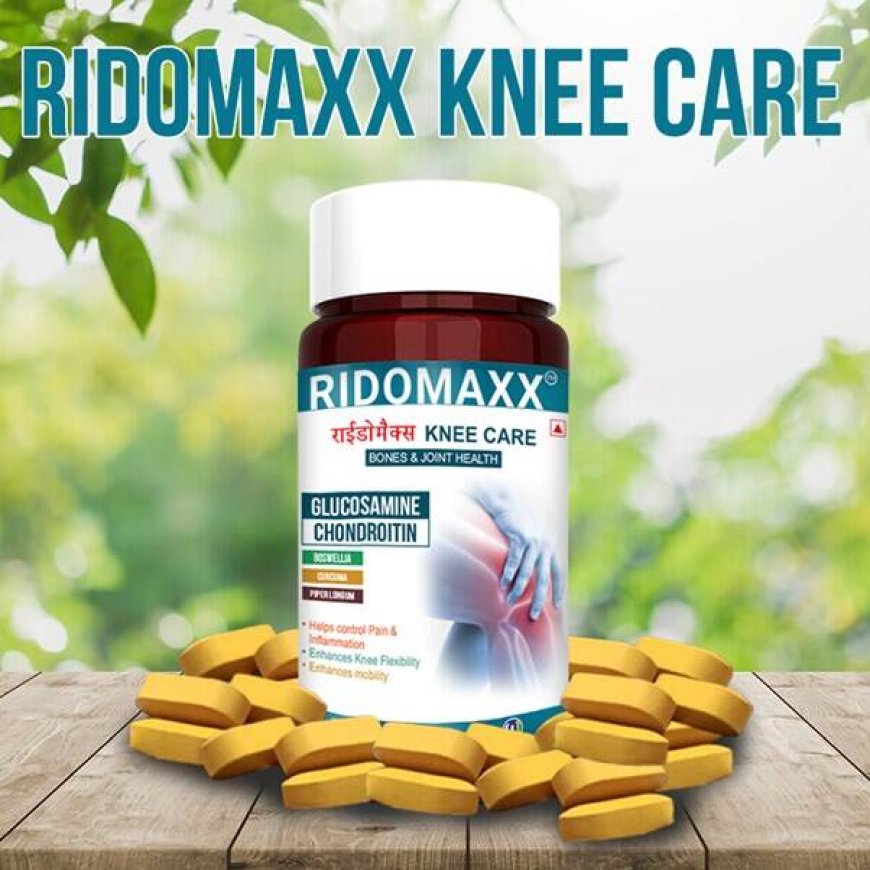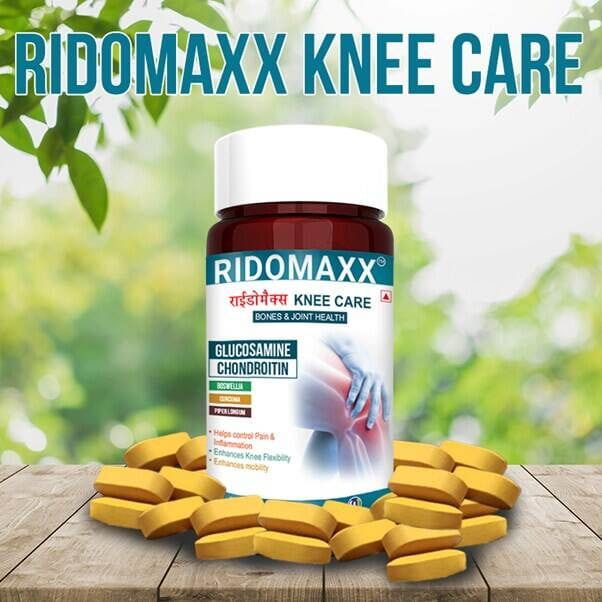The Role of Supplements in Improving Knee Flexibility
Discover how supplements like knee care tablets enhance knee flexibility, support joint health, and reduce discomfort for improved mobility.

Flexibility of the knees is a vital aspect for mobility and physical well-being, enabling an individual to perform his daily activities and maintain an active life. These joints are load-bearing and carry loads most of the time, which makes them prone to wear and tear, leading to pain and loss of flexibility. The new-age solution is to address these problems by using supplements intended to help the maintenance of joint health and knee flexibility; supplements that nourish the joints with vitamins and minerals required by natural compounds such as knee care tablets provide nutrients needed for cartilage repair, inflammation reduction, and mobility of all the joints.
Preventive measures are essential to maintaining joint health, especially since most knee complaints nowadays are aggravated by modern lifestyles and those associated with aging. Targeting such complaints is what Knee Care Tablets are made for in combination with all the above key ingredients such as glucosamine, chondroitin, omega-3 fatty acids, and anti-inflammatory agents like turmeric and Boswellia. These further work together to improve cartilage health and lower stiffness while improving joint lubrication. With the proper supplementation in addition to exercise, an individual can gain better flexibility of the knee, thus staying active and in control of quality living. Along with exercise and a balanced diet long term, supplementation is a holistic approach to the care and maintenance of knees that offers healthy, flexible joints.

Here are some roles of supplements in improving knee flexibility:
Vitamin C: Collagen Synthesis and Tissue Repair
Vitamin C is needed for the actual synthesis of collagen, which gives rise to cartilages, tendons, and ligaments. Cartilage is an important cushion for knee joints. Keeping that intact is needed for flexibility and painless movement. The growing and repairing activities of vitamin C go to build up a resiliency to injuries that occur through physical wear and tear. Citrus fruits, bell peppers, and strawberries are wonderful sources of vitamin C; supplements further boost the nutrient for individuals who have higher joint stress or are otherwise deficient.
Vitamin D: Bone Health and Joint Mobility
Vitamin D, the vitamin that gives sunshine, represents another essential element which keeps bones strong and joints movable. It also plays an important role in the absorption of calcium, which is an important mineral needed for bone mass. For many people who do not have a good store of vitamin D through sun exposure, intake and consumption of vitamin D supplements will generally improve flexibility and functionality of their joints.
Vitamin K: Interaction with Vitamin D Relative to Bone Density
Vitamin K, like vitamin D, has important functions in the control of calcium levels in the body and bone density. In curbing deposition of calcium in soft tissues, nutrients ensure that it is only used in the end for mineral enhancement. It thereby helps counteract stiffness in joints and supports general joint mobility. Overall, vitamin K is, therefore, must-have knee health supplements.
Vitamin E: Deliverance from Oxidative Stress
The joints are being protected from the oxidative effect of free radicals by vitamin E as an excellent antioxidant. If continued, oxidative damages result in inflammation, joint degradation, and reduced flexibility over time. Furthermore, vitamin E neutralizes these harmful molecules so that joint integrity is maintained, thus reducing risk factors for chronic conditions such as arthritis.
B Vitamins: Limits Cartilage Damage
B vitamins, most importantly B6 and B12, have an impact on homocysteine levels-a condition wherein heme amino acids have been associated with cartilage damage and inflammation. It's impossible to mention here to realize that lowering levels of homocysteine would allow B vitamins to protect cartilage that has been ameliorated by mobility in knee-joint flexibility and further health. But it's not all B vitamins; these are most importantly energy vitamins because they keep energy delivery to mobilize the most active of you.
Omega-3 Fatty Acids: Anti-Inflammation Properties
The omega-3 fatty acids, such as those derived from fish oil or flaxseed, are also well known for their anti-inflammatory actions. Healthy fats found in these so-called oils have been cited to relieve swelling and inflammation of the knees, therefore increasing joint mobility and reducing pain. They are sometimes used as a supplement for restoring normal mobility in patients with arthritis or diseases that have an inflammatory element to them.
Calcium and Magnesium: Constructing the Bones Strong
Calcium is in fact the foundation for healthy bones, while magnesium serves to help absorb and utilize it. In that, both minerals maintain sturdy bones and avoid stiffness necessary in flexibility of the knee specifically. Supplementation with calcium and magnesium is particularly vital to the elderly and at risk for osteoporosis.
Chondroitin: Maintaining the Health of Cartilage
Chondroitin is naturally present in cartilage and performs its function of holding the water in the tissue, keeping it soft and healthy. It also inhibits enzymes that break down cartilage thereby retarding the progress of joint wear. Chondroitin supplements are often combined with glucosamine for fuller joint health benefits.
Turmeric: By Nature, an Anti-Inflammatory
Turmeric is a bright yellow spice that has a bright yellow color as it contains curcumin, a great antioxidant and anti-inflammatory compound. Curcumin can be of great help in relieving joint pain and stiffness, thus making knee flexibility easier. It is recommended to have such turmeric supplements which have greater bioavailability as curcumin is not absorbed very easily on its own.
Boswellia: Helping in Joint Movements
Boswellia, known as Indian frankincense, is a natural anti-inflammatory agent that has been used for centuries to improve joint health. The active compounds of Boswellia acid reduce pain in addition to improving mobility in the knees. Boswellia supplements work best when paired with other anti-inflammatory nutrients.
Glucosamine and Chondroitin Sulfate: The Building Blocks of Cartilage
Glucosamine and chondroitin sulfate are components that form the cartilage that supports joint health and flexibility. These compounds are mainly responsible for the pain and stiffness relief in osteoarthritis patients. They promote the repair of cartilage and prevent further breakdown, maintaining knee flexibility.

Conclusion
Flexibility in the knee joint is that aspect of the human body that keeps a person fit and healthy, and the supplements are a very important factor in this formulation. Key vitamins like C, D, and K, compounds such as glucosamine, chondroitin, and omega-3 fatty acids are specially formulated in knee care tablets to target knee health and deliver vital supplements. It cushions cartilage, lubricates joints, and reduces inflammatory and oxidative effects the most common cause of knee stiffness and pain. It should be used regularly along with a healthy lifestyle. The knees will be strong, flexible, and able to bear daily movements without pain.
The knee care tablets are also a preventive measure from joint problems rather than a cure. These kinds of supplements can help achieve a more productive and healthy life for individuals across all age constituents by mending the cause of joint stiffness and tissue regeneration. The tedious nature of the knees, requiring continuous supplement maintenance, warrants that in the case of pain, there be an alternative and better option to spend sleepless nights. With the right care and supplementation now, the knees become the promise of more mobility in the future without pain.
What's Your Reaction?





















